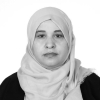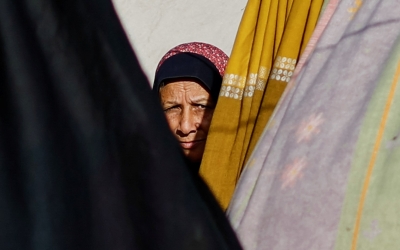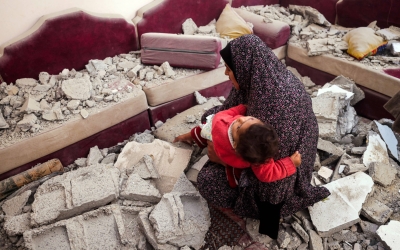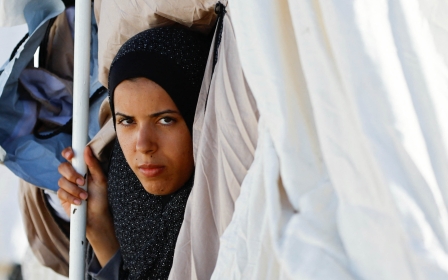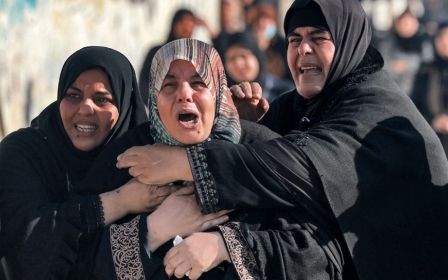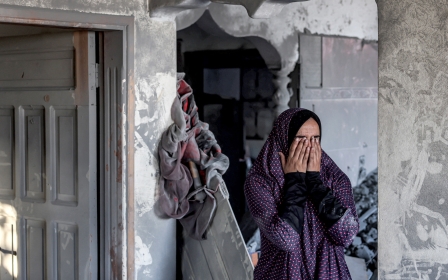War on Gaza: The terrible toll on women's mental and physical health
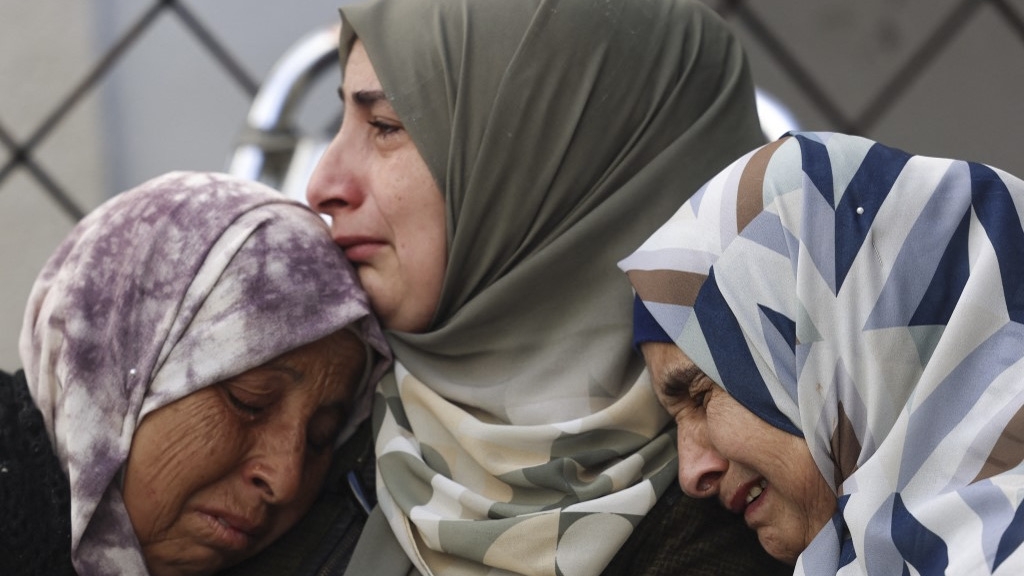
Living amid the relentless onslaught of Israeli forces in Gaza, Palestinian women endure a daily reality of sadness, trauma and fear.
For 137 days and counting, Palestinian women have been deprived of access to vital menstrual health supplies and pregnancy care, plunging them into heightened health risks, particularly for those living in temporary shelters such as tents and schoolrooms.
The present harsh winter conditions are intensifying their suffering. They struggle with inadequate winter clothing and blankets.
Access to clean water, sanitation facilities and hygiene products has been severely limited, further compromising women's health and risk of infection. Privacy is a luxury in these crowded conditions, amplifying their distress.
The shortage of pain relief medications and other essential treatments, coupled with the overwhelming demand for medical attention among displaced individuals, worsens the already dire situation.
New MEE newsletter: Jerusalem Dispatch
Sign up to get the latest insights and analysis on Israel-Palestine, alongside Turkey Unpacked and other MEE newsletters
The inescapable sense of insecurity, with even hospitals and clinics being targeted, instils constant fear, increasing the long-term psychological and health effects faced by Palestinian women.
The loss of specialised psychological support services due to the destruction of facilities, such as the women's health centre in Bureij Camp, has left many women and children without crucial avenues for care.
Coupled with economic hardships and inadequate nutrition, their distress is monumental.
Embarrassment and shame
Added to the physical discomfort is the emotional distress, embarrassment and shame that erodes their sense of dignity and self-worth. The lack of essential medical supplies compounds their sense of powerlessness and hopelessness, leaving them susceptible to a range of mental health challenges, including anxiety, depression and despair.
Sanaa Abu Ras, a displaced resident of North Gaza, vividly illustrates the anguish faced by mothers caring for daughters with special needs. Her daughter, Reham, experiences heightened risks during menstruation due to her autism.
Follow Middle East Eye's live coverage of the Israel-Palestine war
The scarcity of essential supplies and regular psychological sessions intensifies the burden on mothers like Sanaa, who create makeshift sanctuaries within their cramped living quarters to provide a semblance of privacy and comfort amid the chaos of displacement.
“I wait for the scarce assistance provided by the shelter, which in most cases is almost non-existent for several days," Sanaa said.
"Interruptions to Reham’s psychological sessions have increased the burden. My daughter needs her own space, so I covered a table with blankets to try to alleviate her distress and give her some privacy.”
The psychological wellbeing of Palestinian women is intricately tied to their menstrual health, which has been upended by the volatile conditions on the ground. The harrowing realities of the Israeli war have caused pervasive fear, anxiety and the loss of vital social connections necessary to heal.
These adversities manifest in various ways during menstruation. Irregular cycles, prolonged menstrual periods, and even the absence of menstruation for several months have been reported by women taking shelter at the UN school in Deir al-Balah.
Reham's story epitomises the struggles endured daily by countless Palestinian women in the Gaza Strip, underscoring the urgent need for comprehensive support systems and resources to address the unique psychological and healthcare needs of women amid the ongoing humanitarian crisis.
Deprived of basic necessities
The plight of pregnant Palestinian women is also worsened by the current circumstances and the devastating impact of the ongoing Israeli war. Pregnancy demands comprehensive care, encompassing physical, emotional, social and cultural support to facilitate a smooth conception, labour and delivery process.
However, the unstable psychological environment, continuous bombing, and pervasive fear experienced by Palestinian women in Gaza are resulting in tragic outcomes such as miscarriages and loss of lives, including unborn children, due to direct targeting by Israeli occupation forces.
Alaa Muhammad, a 22-year-old woman from Khan Younis, shared her frightening experience of being moved to Unrwa schools for safety while five-months pregnant, only to be forced further to Rafah near the Egyptian border amid relentless attacks.
Alaa vividly described the callousness of the Israeli occupation forces, who showed no regard for the vulnerable conditions of pregnant women
Alaa vividly described the callousness of the Israeli occupation forces, who showed no regard for the vulnerable conditions of pregnant women, compelling them to flee without provisions, facing perilous conditions and constant threats of violence.
In Rafah, Alaa's situation worsened as she resorted to living in a makeshift tent, enduring freezing temperatures and being deprived of basic necessities. The absence of proper medical care, including prenatal check-ups and adequate nutrition, compounded her challenges as she approached her due date.
Accessing transportation to a maternity hospital became a daunting task, and upon reaching the overcrowded Emirati Maternity Hospital, she endured agonising hours waiting to give birth.
Tragically, the hospital's overcrowded conditions forced Alaa to leave shortly after giving birth, returning to her inadequate shelter with minimal supplies for herself and her newborn. Daily they struggle to survive.
Caesareans without anaesthetic
The complexity of the situation intensifies when a woman undergoes a caesarean section to deliver her baby. This procedure can significantly elevate psychological stress levels.
As the anticipated delivery date approaches, fear, anxiety and stress escalated by the ongoing targeting of Palestinian hospitals further amplifies the suffering of pregnant Palestinian women.
Often, women who do manage to reach the hospital for their scheduled deliveries discover that their procedure has been cancelled due to the overwhelming number of casualties the hospital must attend to that day.
"I was repeatedly surprised to learn that my caesarean operation had been postponed, only to face further cancellations upon my return to the hospital," said Rumana Ali. "I endured four futile trips until finally giving birth."
On her delivery day, she was shocked to discover that there was no anaesthetic available for the operation.
During the procedure, she pleaded with the doctor to stop due to the lack of anaesthetic, jeopardising her and her child's safety. The aftermath of the operation only deepened her physical and psychological pain, as essential post-operative care such as medication, antibiotics and pain relief were lacking.
Fear and anxiety consumed her as she worried about potential health complications and infections. Due to inadequate care, she lost her baby. She continues to grapple with the psychological shock of the tragic loss of her child, struggling with depression and enduring pain.
The heartbreaking and terrifying experiences of Reham, Alaa and Rumana underscore the urgent need for an end to the war and for displaced families to be able to return to their homes and rebuild their lives.
It is a plea for humanity and justice amid the chaos of this vicious war, echoing the resilient hope for a future where Palestinian women can live in peace and security, and where Palestinian mothers can bring their children into the world with dignity and security, like all mothers of the world.
The views expressed in this article belong to the author and do not necessarily reflect the editorial policy of Middle East Eye.
Middle East Eye delivers independent and unrivalled coverage and analysis of the Middle East, North Africa and beyond. To learn more about republishing this content and the associated fees, please fill out this form. More about MEE can be found here.


